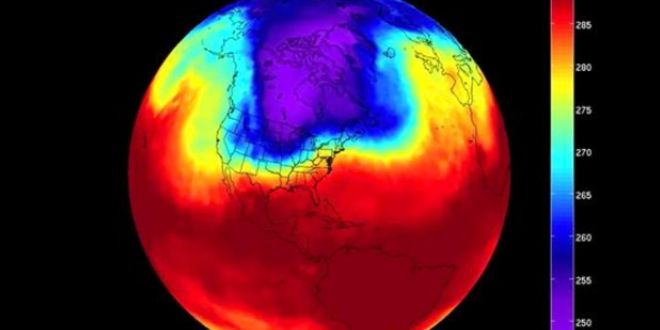In 2024, the planet’s temperature will exceed the 1.5° threshold. This was announced on Monday by the European Copernicus Observatory. It is the warmest year on record and will be the first to exceed the warming threshold set by the Paris Agreement.
“There is certainty that 2024 will be the warmest year on record,” and the average temperature will exceed “by more than 1.5°C the pre-industrial level,” reported Copernicus’ climate change service.
This comes after the second warmest November on record.
The planet’s temperature at a historical level
 The planet’s temperature at record levels.
The planet’s temperature at record levels.
According to estimates, these historical levels could persist in the coming months, with worldwide temperatures forecasted to be “close to records” in early 2025.
This was confirmed to AFP by Julien Nicolas, a scientist from the observatory, especially because the return of the La Niña phenomenon, synonymous with cooling, remains uncertain this year.
What happened in November
November was characterized by a series of severe typhoons in Asia and the continuation of historic droughts in southern Africa and the Amazon. That’s why it was 1.62°C warmer than the normal month during the time when humanity did not use oil, gas, or coal on an industrial scale.
November was the 16th out of the last 17 months to register an anomaly of 1.5°C compared to the 1850-1900 period, according to the Copernicus ERA5 database.
This symbolic threshold corresponds to the most ambitious limit of the 2015 Paris Agreement, which aims to keep warming below 2°C and continue efforts to limit it to 1.5°C.
The Treaty refers to long-term trends. Therefore, an average warming of 1.5°C must be observed over at least 20 years to consider the limit exceeded.
Taking that criterion into account, the climate has currently warmed by 1.3°C. They consider that the 1.5°C threshold will likely be reached between 2030 and 2035.
Global warming: where current policies are heading
According to the latest calculations from the UN, the world is not on track to reduce its carbon pollution sufficiently to avoid a significant worsening of droughts, heatwaves, or heavy rainfall.
Current country policies are leading the world towards a “catastrophic” warming of 3.1°C during the century, or 2.6°C if promises to improve are fulfilled.
Countries have until February to submit to the United Nations the review of their climate goals from now to 2035, known as “Nationally Determined Contributions” (NDC).
However, the minimum agreements of COP29 at the end of November may be invoked to justify low ambitions. Developing countries received a promise of 300,000 million dollars in annual aid from rich countries by 2035.
This amount is less than half of what they requested to fund the energy transition and their adaptation to climate damages.
The Baku summit concluded without explicit commitment to accelerate the “transition” towards phasing out fossil fuels, approved at COP28 in Dubai.
 Global warming.
Global warming.
In 2024, natural disasters fueled by warming caused economic losses of 310,000 million dollars worldwide, as assessed on Thursday by Swiss Re, the Swiss group that acts as an insurer for insurers.

